A long-awaited report on how women born in the 1950s were affected by increases to their retirement age has recommended they are owed compensation.
An investigation by the Parliamentary and Health Service Ombudsman (PHSO) found that thousands of women may have been affected by the government’s failure to adequately inform them of the change.
Politics Live: Autumn timeframe’ for election, minister says
To date, the Department for Work and Pensions (DWP) has not acknowledged its failings or put things right for those women affected, the watchdog said.
The ombudsman noted that the department has indicated it won’t comply with the findings and called on parliament to intervene.
PHSO chief executive Rebecca Hilsenrath, said: ”The UK’s national ombudsman has made a finding of failings by DWP in this case and has ruled that the women affected are owed compensation.
“DWP has clearly indicated that it will refuse to comply. This is unacceptable. The department must do the right thing and it must be held to account for failure to do so. ”
Extinction Rebellion: Climate activists stage protest dancing to Stayin’ Alive by Bee Gees in Edinburgh
Work until you’re 71? What’s the alternative?
Moderate standard of living in retirement costs £8,000 more a year, industry body says
Ms Hilsenrath said that given the ombudsman’s “significant concerns” that the DWP won’t act on its findings, “we have proactively asked parliament to intervene and hold the department to account”.
“Parliament now needs to act swiftly, and make sure a compensation scheme is established. We think this will provide women with the quickest route to remedy.”
The finding follows a long-running campaign by the Women Against State Pension Inequality – often known as WASPI women.
The group say millions suffered financially as they were not given sufficient warning to prepare for the change.
Any compensation bill is likely to cost billions, given around 3.8 million women were effected.
However, the PHSO’s findings are not legally binding.
Why was the sate pension age changed for women?
The state pension age was aligned to match men in a move praised for improving gender equality.
For decades, men had retired at 65 while women had retired at 60.
A law was passed in 1995 setting out a timetable to eventually raise the retirement age for women so it would match the age for men.
Read More:
Generation of women in debt after state pension fallout
The original plan was to phase in the change over a 10-year period between 2010 and 2020 to allow people sufficient time to plan ahead.
However, in 2011 the coalition government accelerated the shift to reduce costs, with the increase in retirement age brought forward to 2018.
WASPI agrees with the equalisation of ages, but says they were not properly informed of the changes, giving them insufficient time to prepare or make other financial arrangements.
Liberal Democrat Chief Whip Wendy Chamberlain said WASPI women have £tirelessly campaigned for justice after being left out of pocket”
“Liberal Democrats have long supported WASPI in their campaign and it is now up to this Conservative Government to come forward with a plan to get these women the compensation they are owed.”





